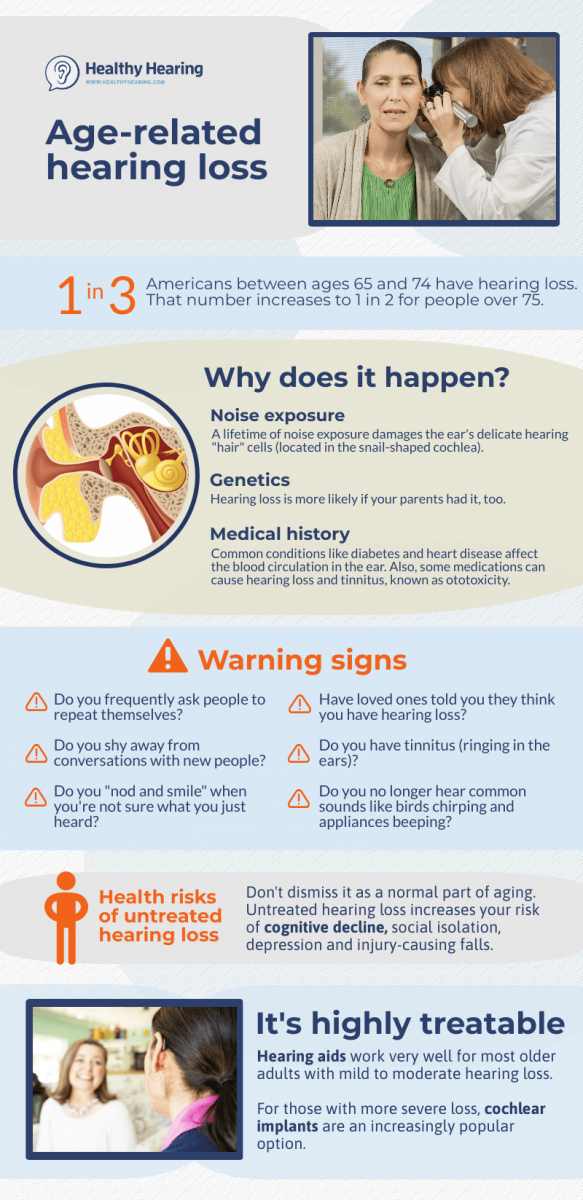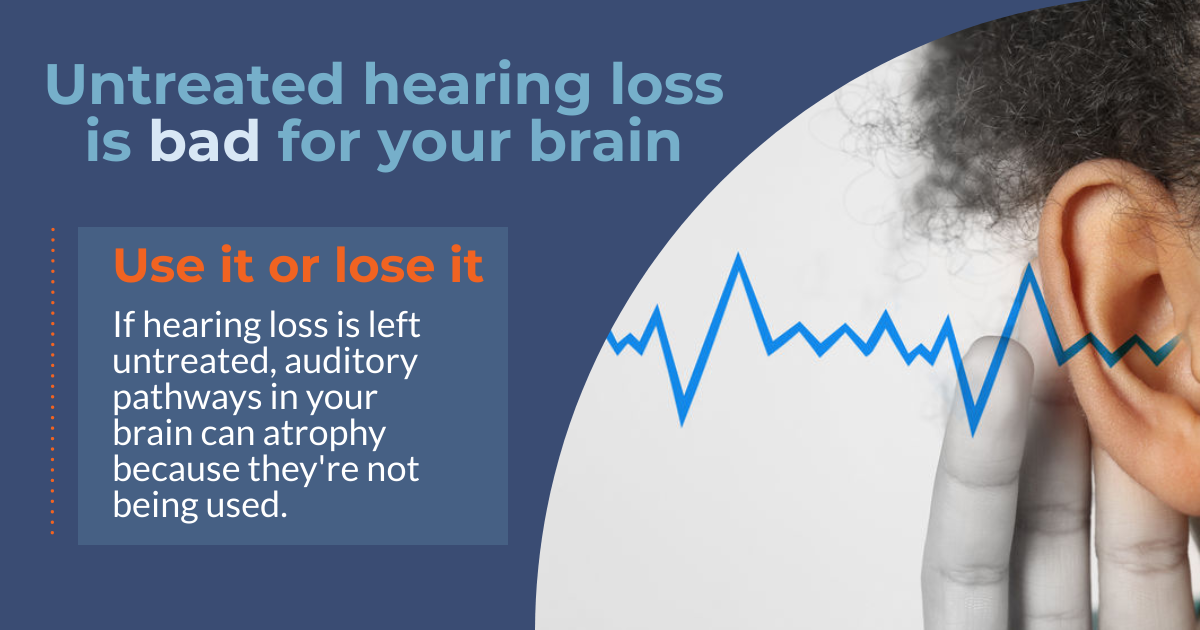If a hearing healthcare professional diagnoses you with age-related hearing loss (presbycusis), you’re in good company. About one-third of adults between 65 and 70 have some degree of hearing loss, according to the National Institute on Deafness and Other Communication Disorders. About half of all people 75 and older have hearing loss.
Why do we lose hearing as we age?
As we get older, degeneration within the inner ear and along the nerve pathways to the brain can impact our hearing. Most of the time, these changes are related to the health of tiny hair cells in the inner ear that help us hear. These hair cells translate the sound waves our ears collect and translate them into electrical signals for the brain to interpret as recognizable sound. Since hair cells do not regenerate or regrow, any hearing loss we experience as a result of this damage is permanent.

Presbycusis: Hearing loss in old age
Presbycusis is the medical name for age-related hearing loss. It’s one of the most common types of sensorineural hearing loss, which means hearing loss related to sensory and nerve cells.
There are also a few other less common types of presbycusis that differ slightly in how and when they affect people, and a person may have multiple forms.
For the most part, this type of hearing loss usually occurs gradually over the span of many years. It usually affects both ears simultaneously (known as “bilateral hearing loss”).
Will I lose my hearing as I get older?
It depends largely on your genetic and medical history, as well as your exposure to noise over the years. A firearm enthusiast is at much higher risk than a gardener, for example. Because of the nature of their work, veterans are at perhaps highest risk for both hearing loss (and tinnitus) as they get older. In general, factors that contribute to presbycusis include:
- Did your parents have hearing loss? You may have inherited that tendency, too.
- Certain medical conditions that affect the blood supply to the middle ear, such as heart disease, high blood pressure, diabetes and other circulatory problems.
- Ototoxic medications, which are drugs that can affect hearing. For example, toxic side effects of certain medications, such as aspirin and antibiotics, can negatively affect your hearing. Compared to younger adults, older adults are more likely to take medication and experience side effects.
- Noise-induced hearing loss (NIHL). Prolonged exposure to excessive noise at work, home or during leisure activities can cause this type of hearing loss.
What are the symptoms of hearing loss in old age?
Because presbycusis occurs gradually, many people don’t realize they’re having difficulty hearing. If you’re older and having hearing problems, here are some symptoms that indicate you may have presbycusis:
- Other people seem to be mumbling or slurring their speech and language. In other words, you find that you can hear but not understand.
- Conversations are difficult to understand, especially when there is background noise
- Certain sounds seem overly loud or annoying
- You have difficulty hearing higher pitched sounds, such as the telephone ring or birds chirping
- Men’s voices are easier to understand than women’s and children’s voices
- You are experiencing a ringing, buzzing or hissing sound in one or both of your ears, also known as tinnitus, that won’t go away.
How is age-related hearing loss diagnosed?
If any of the symptoms we’ve listed are affecting your ability to hear, make an appointment to see a hearing healthcare professional as soon as possible for a hearing evaluation. The results of this evaluation will help determine the cause and extent of your hearing loss, as well as the best solution for treating the problem.
Is there a cure for presbycusis?

could be age-related hearing loss.
Like most types of sensorineural hearing loss, there is no cure. Fortunately, though, most cases of sensorineural hearing loss can be treated.
- Hearing aids. Those with mild-to-moderate hearing loss may benefit from wearing hearing aids. After a thorough hearing evaluation, a hearing healthcare professional will recommend the type and style of hearing aid according to the severity of your hearing loss, lifestyle preferences and budget.
- Cochlear implants, which can be given to older adults. If you are diagnosed with severe or profound hearing loss, you may benefit from using a cochlear implant. These medical devices are surgically implanted behind your ear to help detect sound and understand speech.
- Assistive listening devices (ALDs). Technology is available to amplify sound from your television, telephone and other personal electronic devices. ALDs can be used with or without hearing aids, depending on the type and severity of your hearing loss.
Can I prevent hearing loss associated with old age?
While you can’t do anything about your relatives (much as many of us try), you can take steps to prevent some lifestyle factors linked to hearing loss.
- If you’re diabetic, have heart disease or other circulatory problems, follow your doctor’s guidelines for diet and exercise. The hair cells in the inner ear depend on good blood flow to keep them healthy. Maintaining a healthy weight and exercising regularly can facilitate hearing health.
- Ask your doctor about the medications you’re taking. Are they linked to hearing loss? If so, ask if she can prescribe an alternative medication. If you take large amounts of aspirin or other pain relievers, cut back or try to find alternative methods of pain relief.
- Be aware of loud noises in your environment. According to the NIDCD, noise-induced hearing loss is the only type of hearing loss that is completely preventable. Sounds measuring more than 85 decibels (think heavy city traffic, motorcycles, emergency sirens and rock concerts) for long or repeated periods of time can permanently damage your hearing. Hearing health experts recommend wearing ear plugs or other hearing protection when you’re working or playing around noisy equipment or recreational vehicles. If you can’t reduce the noise or protect your ears, move away from it.
Health risks of untreated hearing loss when you’re older

The longer you let your hearing go untreated, the harder it will be to hear better once you do get heraing aids. This is due to auditory deprivation, which is not just bad for your hearing. Research indicates untreated hearing loss among older adults puts people at a greater risk for developing dementia and Alzheimer’s disease as well other emotional and physical problems. The good news? Hearing aids can delay the onset of these conditions.
They’ll also help you live better. Although today’s hearing aid technology won’t restore your hearing to normal, it will greatly improve your quality of life. This quality-of-life boost applies to any older adult with hearing loss, including those in nursing homes and assisted living.
How to get help for presbycusis
The key is to have your hearing evaluated and follow the recommended course of treatment if you are diagnosed with hearing loss. For a list of hearing healthcare professionals in your community, along with verified patient reviews, visit our directory of hearing clinics.
